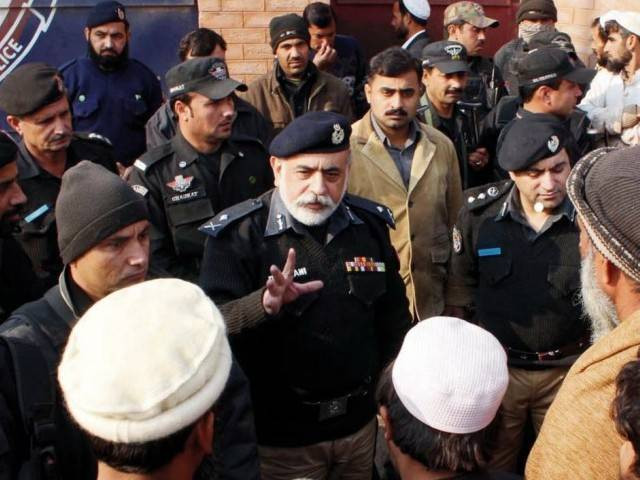K-P suffers as govt, police lock horns
Extortion, targeted killing, blasts multiply as power play between bureaucracy, top cop continues

Extortion, targeted killing, blasts multiply as power play between bureaucracy, top cop continues. PHOTO: INP
Are the people more concerned about the region’s security status? Yes. Are they alone in this state of dissatisfaction? No. The powerful trade and business communities as well as the chief executive of the province, Chief Minister Pervez Khattak, are demanding a paramilitary solution. A solution which Khattak put to words through a letter addressed to the federal government. He asked for the deployment of rangers on the boundaries between Fata and K-P.
Yet this demand has not come across as a plain desire to pad security. Not when the bureaucracy and IGP Nasir Durrani butting heads over the demarcation of power and police reforms.
Violence in Khyber-Pakhtunkhwa and adjoining Federally Administered Tribal Areas keeps bringing into question the ruling party’s election manifesto which claimed to depoliticise the police force.
The rising tide
Even if Operation Zarb-e-Azb destabilised militant networks in Miranshah and Mirali in North Waziristan Agency, even if most militants have slipped away to Afghanistan or other parts of Pakistan, terrorism is by no means over. Militants mark their presence frequently in Waziristan, be it an army captain’s death among four killed in Shawal or the abduction of nine FATA Development Authority employees from Toi Khulla, Wana.
K-P is no less volatile – senior trader Haleem Jan was gunned down in broad daylight in Qissa Khwani on February 9, a botched car check near the airport left a woman dead after a guard opened fire on March 6, a Frontier Corps soldier was found shot dead in his car on March 10 and on March 11 an army colonel was killed by armed assailants, also in the middle of the day on a very busy Ring Road. All these people were killed in the provincial capital.
These target killings come with a side of choreographed attacks in adjoining cities—with less security—such as the ones on Bacha Khan University in Charsadda or the NADRA office in Mardan, and more recently, the attack on Shabqadar courts. All death tolls were in double digits.
All this while, traders, businessmen, industrialists, doctors—you name it, the profession is up there—are being extorted. Phone calls asking for millions precede the inevitable grenade attack – it would seem after guns, grenades are being sold like candy.
In the years gone by, target killing was considered the mainstay of sectarian violence. Now it’s a disease, infecting all of K-P. If Peshawar is not enough to go by, we can see Swat where over a dozen have fallen victim in a month.
The Baboo-effect
Going back to the estrangement between bureaucracy and K-P’s top cop at CPO, the last few weeks have seen the struggle for power go from closed doors to public podiums.
Reports have emerged of heated arguments between the two in official meetings. And even as Khattak told the media in his native Nowshera that the clash was a run-of-the-mill disagreement, Durrani took to the stage and spoke of enemies who “in the garb of a friend” were bringing into doubt the capability of the police to fight those the public was being made to fear. The IGP on separate occasions has also been reported to have expressed resentment over a reception held by officials in Malik Shaheed Police Lines to honour his would-be successor.
Tall claims by lofty folks
All this while, the public, defined as common by the annals of history, is the loser. To say the people of K-P have suffered for over a decade has started to sound like a cliché but it has always been true.
Pakistan Tehreek-e-Insaf Chairperson Imran Khan might like to believe the police in the region he indirectly governs is depoliticised because the government was told to not interfere. But instead of believing reports that all is well, he would be in a better position to assess if he met ‘the common man’ coming out of a police station.
As far as I and others around me can see, nepotism and favouritism are still in play in police postings and transfers. We have the right to question why or how the one time honest, talented, neutral and competent police chief has now become “incompetent” in letters written against him by the Baboos.
If the people and politicians irrespective of their political identity and their stakes are voicing the same concerns and are suggesting ways to tackle deteriorating law and order, then their voice should be heard. But all their hue and cry is going unnoticed.
It all harks back to the Great Game; the war against the former Soviet Union on the bloodied soil of the Afghans, which eventually cannibalised its own nationhood as others came and went, the latest withdrawal the US-led allies. Pakistan and its closest border of K-P and Fata were used, willingly, as a launching pad for wars innumerable, the country’s geopolitics trumping its local policy.
The region is far from stable, not even close to it as the US pulls away from its ally Saudi Arabia. But for now, starting from K-P and Fata, the country needs to prioritise its people first.
The government and the police need to be at the same table with the same agenda – securing its people, common or uncommon.
Published in The Express Tribune, March 14th, 2016.













COMMENTS
Comments are moderated and generally will be posted if they are on-topic and not abusive.
For more information, please see our Comments FAQ